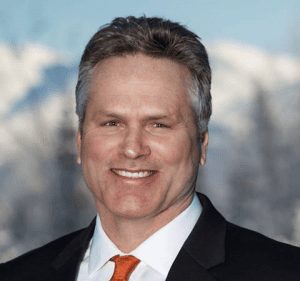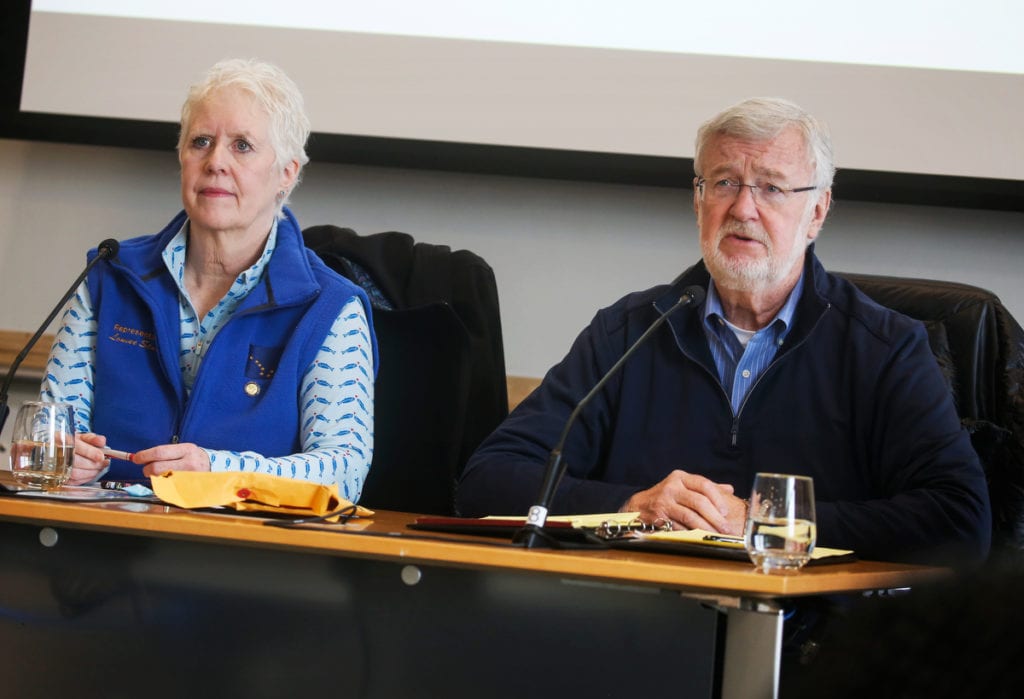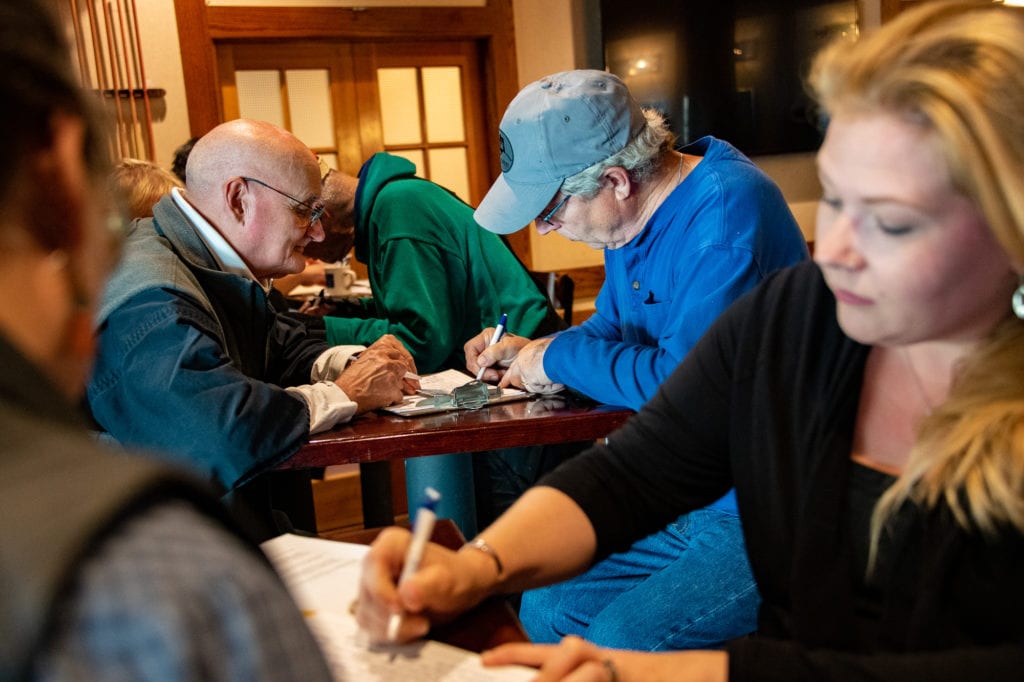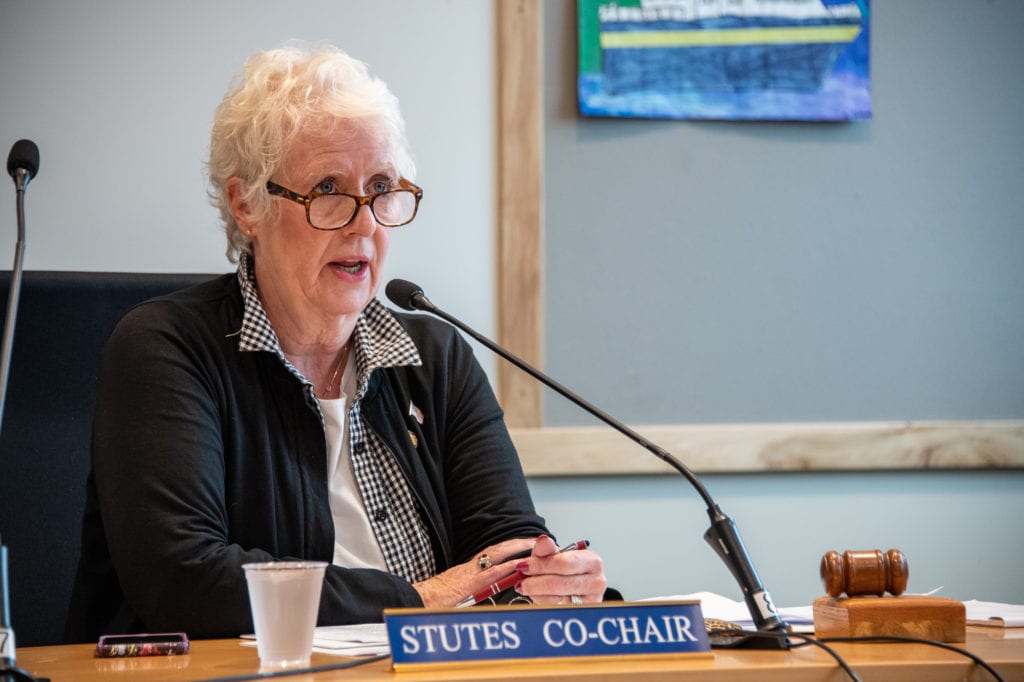
Gov. Mike Dunleavy has made his final decision on the state operating budget, reversing some of his initial line item vetoes, but reaffirming cuts of millions of dollars in others, plus $5 million recently added by the Legislature for the Alaska Marine Highway System.
In announcing his final operating budget vetoes in a recorded video on Monday, Aug. 19, Dunleavy, who campaigned for governor with a promise of a $3,000 Alaska Permanent Fund check, agreed for now to the $1,600 dividend.
“I will not veto this incomplete dividend,” he said in his online video. Then he added that he would continue to pursue the remaining $1,400.
“If I had the authority to add more money to the budget for a full PFD, I would,” he said. “However, only the Legislature, by constitution, can appropriate these funds.”

He added that he intends to “introduce legislation to provide for a full statutory PFD through a payment from the Earnings Reserve Account.”
Dunleavy did not take questions from news media following the release of the video streamed online, but held a teleconference Tuesday, Aug. 20.
Dunleavy’s decision regarding the PFD and his reversal on some line-item vetoes make it pretty clear he is reacting to the public response to the initial list of vetoes, including the movement to recall him from office, said Sen. Gary Stevens, R-Kodiak.
“I think he’s finally paying attention to that,” he said.
“We have this wonderful $65 billion Permanent Fund,” Stevens said. “If we are wise, we can keep it growing. In a few years, it could be $100 billion. The most we should take out of the earnings reserve is 5 percent.”

Stevens and Rep. Louise Stutes, R-Kodiak, were both critical of Dunleavy’s decision to veto the $5 million in AMHS funds legislators recently added back into the operating budget.
“We knew what the problems were (with the ferry system budget) when he first put out his budget,” said Stevens, noting the particularly severe impact of that cut on Cordova. “We thought the $5 million would help solve the problem and then to see it yanked back at the last minute was shocking. The department was in there with us.”
Stutes said she found Dunleavy’s decision to veto that $5 million inconceivable.
“He said ‘I am listening to the people of Alaska,’ and yet he vetoes this money for AMHS,” Stutes said. “I need to ramp up our forces to relate on this a little louder on how critical and important the AMHS is to coastal Alaska. That is my intent, to allow him to hear us loud and clear. Those dollars would have directly gone to Prince William Sound and Southeast Alaska.”
Stutes noted that the public hearing held in Juneau on the ferry system budget broke all records with the state for testimony from the public, including numerous comments from people calling in from around the state.
“Clearly it is important to the people of Alaska,” she said. “For the governor not to hear us is inconceivable. It is just overwhelming.”
Stevens said that in general the state should be looking for budget reductions that make sense. Legislators did make $200 million in cuts, but that Dunleavy didn’t think that was enough, he said. The worst one was the 41 percent cut to University of Alaska funds, said Stevens, who taught history and the humanities at the Kodiak campus for 25 years.
As a professor, he was never very happy with the overhead of deans and assistant deans, but we need a strong university, he said, citing the existing shortage of teachers and nurses in the state. Stevens noted that Jessica Paugh, recently hired as director of Kodiak College, “quit because she saw the writing on the wall.
“We are running people off already before they even arrive,” Stevens said.
The Permanent Fund, if allowed to grow, can pay for all sorts of things, he said.
“The earnings reserve can pay for the PFD, services like K-12 (education),” he said. “If we don’t overspend that fund it will always be there. The experts say we can take 5 percent without any harm. The governor ran on getting a $3,000 PFD and said he would also cut the budget to do that, but he never said when he was running what he was going to cut.”
After Dunleavy announced his first line-item vetoes, 90
percent of his constituents told Stevens
“give me a smaller dividend and save our services,” he said.
The Legislature agrees that we need to rewrite that (Permanent Fund) formula, but that issue may have to be put off until January.
“One of the first things we deal with might be addressing that formula,” he said.
Stevens was also critical of Dunleavy’s cuts impacting K-12 programs, including funds to pay down school bond debt.
“The state in the past has funded to a large extent the building of new schools,” he said. “Dunleavy vetoed twice the debt bonds on new schools. We need to build new schools on a regular basis.”
With the vetoes, most communities will have to raise more money, he said.

Stevens also supports early funding for education. Last year the Legislature approved $1 billion for K-12 education and another $1 billion for future funding for the following year, “because if a district doesn’t have the money in its hands, they have to lay people off,” he said. “We have always seen the wisdom of early funding.”
Early, or forward funding is not unusual, he said.
“Many states do a two-year budget, which is forward funding,” Stevens said. “My biggest concern about next year is what Dunleavy will do to forward funding. If we are thoughtful and reasonable and have some heart, we don’t want to cut education.”
Stevens also criticized Dunleavy’s repeat veto of $335,000 in judiciary budget funds for the Alaska Court System over its rulings on elective abortions.
“I don’t believe that’s constitutional,” he said, noting three branches of government: legislative, executive and judicial. “I believe in the separation of powers. That’s just over the top. I don’t think the governor has that power.”
Other vetoes reinstated by Dunleavy after the Legislature restored funding included elimination of the Ocean Ranger cruise ship pollution inspection program, Medicaid dental coverage for adults and funding for the Alaska Wing of the Civil Air Patrol. Other programs hit with heavy cuts included behavioral health treatment and recovery grants, adult public assistance funds for low income residents who are older blind or disabled, public broadcasting, the Public Defender Agency, and the Village Public Safety Officer program.





